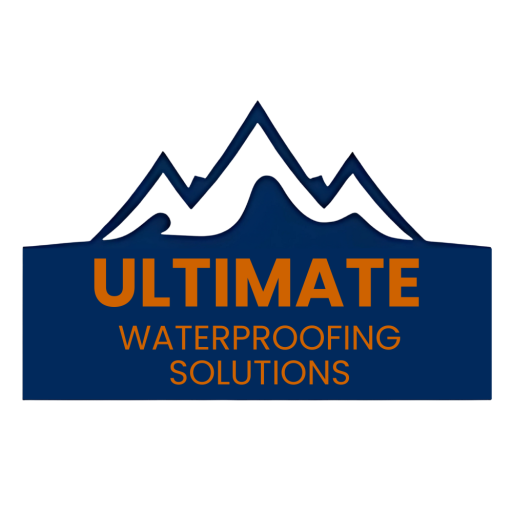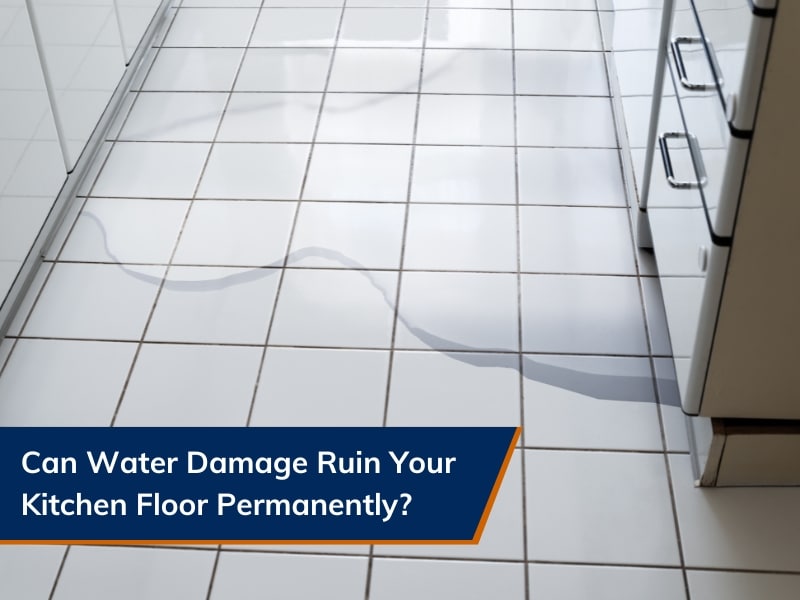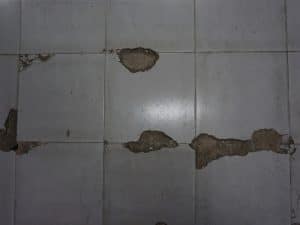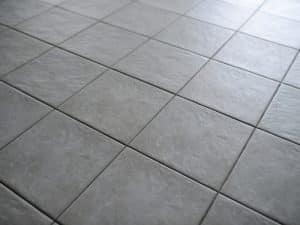Water damage is one of the most common and costly issues homeowners face. When it affects your kitchen floor, it can cause long-lasting consequences. A kitchen is a high-traffic area prone to spills, leaks, and other water-related issues. But can water damage truly ruin your kitchen floor permanently? In this article, we will explore the causes of water damage, its effects on different flooring types, and how you can prevent permanent damage with the help of professional waterproofing services.
What causes water damage to kitchen floors?
Water damage in your kitchen can arise from a variety of sources. The most common causes include:
- Leaks from plumbing: Burst pipes or leaking taps can lead to standing water that seeps into the flooring.
- Spills: Regular spills from cooking, washing dishes, or food prep can accumulate over time if not promptly cleaned.
- Flooding: Severe weather events or a broken dishwasher can cause water to overflow and damage your kitchen floor.
- Condensation: Moisture from cooking or boiling liquids can condense on surfaces, especially in areas with poor ventilation. Understanding and preventing condensation is crucial, as it can contribute to moisture buildup that damages kitchen floors over time.
Identifying the source of water damage early is key to minimising its impact.
How does water damage affect different types of flooring?
Water damage can affect different flooring materials in unique ways. Here’s how it impacts some of the most common kitchen floor types:
- Timber: Wood is highly susceptible to water. Prolonged exposure can lead to warping, swelling, or rotting.
- Vinyl: Vinyl floors may bubble or peel when exposed to moisture over time. The adhesive can weaken, causing sections to lift.
- Ceramic tiles: While tiles are water-resistant, the grout can absorb water. This can lead to mould growth or deterioration of the grout lines.
- Laminate: Laminate floors are typically not water-resistant, so moisture can cause them to swell, peel, or stain.
Understanding the unique risks of your flooring type can help you prevent severe damage.
Can water damage lead to permanent floor warping or discolouration?
Yes, water damage can cause permanent floor warping or discolouration, especially if left unaddressed. Here’s how:
- Warping: Materials like timber, laminate, and even vinyl can warp when exposed to water. Once warped, the flooring may be difficult or impossible to return to its original shape.
- Discolouration: Water can cause stains or discolouration on many surfaces, particularly timber or laminate. If the water is not cleaned up promptly, these stains can become permanent.
- Mould and mildew: Moisture encourages mould and mildew growth, which can discolour surfaces and cause permanent staining or a musty smell.
To avoid irreversible damage, acting quickly when water spills occur is crucial.
How do you know if your kitchen floor has been permanently damaged?
You can often tell if your kitchen floor has suffered permanent damage by looking for the following signs:
- Visible stains or discolouration: Due to water absorption, permanent stains can develop on flooring materials like timber or laminate.
- Warping or buckling: If your floor appears uneven, this could indicate that water has caused it to warp or swell beyond repair.
- Persistent mould or mildew: If you notice persistent mould or mildew growth despite cleaning, it could indicate water damage that has permeated the surface.
- Creaking or softness: If the floor feels soft or creaky when walked on, water may have seeped beneath the surface and damaged the subfloor.
If you notice any of these signs, it is essential to address the issue as soon as possible to avoid further deterioration.
What are the consequences of ignoring water damage in your kitchen?
Ignoring water damage in your kitchen can lead to significant consequences, including:
- Structural damage: Prolonged water exposure can weaken the foundation or subfloor, leading to costly repairs.
- Health risks: Mould and mildew thrive in moist environments. Left unchecked, they can pose health risks such as respiratory problems.
- Higher repair costs: The longer you wait to address water damage, the more expensive the repairs will be. What starts as a minor issue could turn into a major problem.
- Loss of property value: Ongoing water damage can lower the value of your home, as the need for repairs may turn potential buyers off.
Taking immediate action helps mitigate these risks and prevents long-term damage.
What are the best solutions for repairing water-damaged kitchen floors?
Your kitchen floor must be repaired properly if it has sustained water damage. Some common solutions include:
- Replacing damaged sections: If the floor is beyond repair, replacing the damaged sections may be the only option. This is particularly true for wood or laminate floors.
- Regrouting tiles: If ceramic tiles are damaged, you may need to regrout the affected areas to restore their function and appearance.
- Refinishing or resurfacing: For some floor types, like timber, refinishing or resurfacing may be possible to restore the appearance and remove stains.
- Waterproofing after repair: Once the damage has been repaired, consider investing in a waterproofing solution to prevent future issues.
Choosing the right solution depends on the extent of the damage and the type of flooring you have.
Can professional waterproofing services prevent permanent water damage to kitchen floors?
Yes, professional waterproofing services can significantly reduce the risk of permanent water damage to your kitchen floor. Here’s how:
- Sealing leaks: Professional waterproofers can identify and seal leaks in pipes, walls, or flooring.
- Applying protective coatings: A waterproof membrane or sealant can be used on the kitchen floor to create a barrier against water penetration.
- Ensuring proper drainage: A professional waterproofing service can check for any drainage issues contributing to water pooling around the kitchen area.
- Prevention and long-term protection: Waterproofing services offer long-term solutions to protect your kitchen from water damage, preventing future issues from occurring.
Investing in professional kitchen floor waterproofing helps protect your property from water damage for years to come.
How can you safeguard your kitchen floors from future water damage?
Preventing water damage in the future requires proactive measures, such as:
- Regular cleaning: Clean up any spills or moisture on your kitchen floor to prevent water from seeping in.
- Improve ventilation: Ensure your kitchen is well-ventilated to reduce moisture build-up, especially when cooking.
- Install waterproofing systems: Waterproofing solutions, such as sealants and membranes, can protect your floor from future water exposure.
- Maintain plumbing: Regularly check fixtures for leaks or wear and tear to prevent water damage from pipes.
By following these precautions, you can keep your kitchen floor in top condition and avoid costly repairs.
Protect your kitchen with professional waterproofing
Don’t let water damage ruin your kitchen floor. Ultimate Waterproofing Solutions offers expert kitchen floor waterproofing services designed to safeguard your home from leaks, spills, and moisture. Our experienced team utilises advanced techniques to protect your investment and prevent costly repairs. Get a quote from Ultimate Waterproofing Solutions to discover how we can keep your kitchen safe and beautiful.
Frequently Asked Questions About Water Damage and Kitchen Floors
- Can I repair water-damaged kitchen floors myself?
DIY repairs may work for minor damage, but significant issues often require professional help for proper restoration.
- How long does it take for water damage to show on kitchen floors?
Water damage can appear quickly, but visible signs like warping may take days or weeks to show, depending on the extent.
- Will my kitchen floor always need replacing if it has water damage?
Not always. Some floors can be cleaned and sealed, while others, like wood, may need repair or replacement.
- Can water damage to my kitchen floor affect the structure of my home?
Yes, water damage can weaken the subfloor and, if untreated, may affect your home’s foundation.
- Can water damage in the kitchen be prevented altogether?
Complete prevention is hard, but waterproofing solutions and regular inspections can greatly reduce the risk.
- Are there specific kitchen flooring types that are more resistant to water damage?
Yes, materials like vinyl, porcelain tiles, and waterproof laminate are more water-resistant than hardwood.
- Can excessive moisture cause mould under the kitchen floor?
Yes, trapped moisture can lead to mould growth, damaging your floor and impacting health.
- How do I clean up after a water spill on the kitchen floor?
Quickly mop up the water, then dry the area thoroughly with fans or dehumidifiers to prevent damage.
- What role does waterproofing play in preventing kitchen floor damage?
Waterproofing protects your floor from water damage and keeps moisture from reaching the subfloor.
- How can I tell if my kitchen waterproofing system is effective?
Look for signs of water penetration or mould. Regular professional inspections can confirm if it’s working properly.



